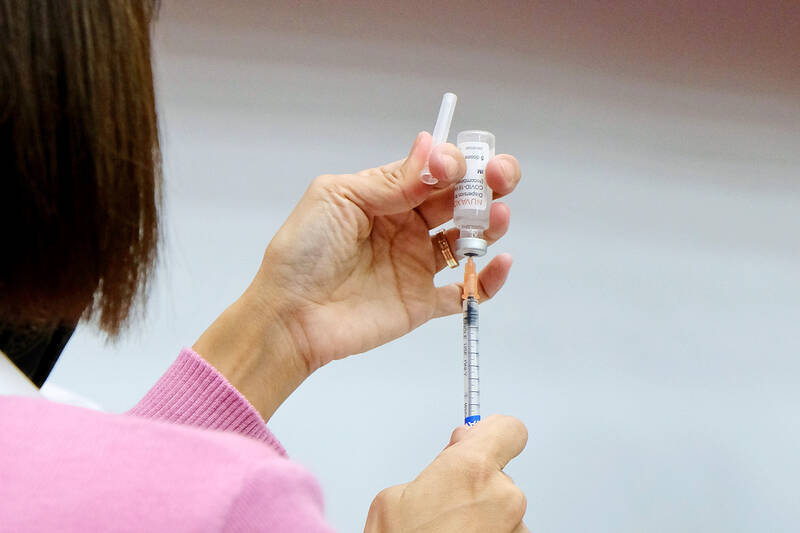Taiwan’s Centers for Disease Control (CDC) on Wednesday announced a plan to buy 5.5 million doses of COVID-19 vaccines targeting new variants that it will begin administering, along with flu vaccines, in October.
Due to the COVID-19 virus continuing to mutate, the CDC will purchase vaccines that offer better protection against new strains, CDC spokesperson Tseng Shu-hui (曾 淑慧) said.
Tseng added that the agency plans to purchase 5.5 million doses within the year, but did not specify which variant the new jab would target.

Photo: CNA
The administration of the new vaccine will be scheduled in two phases and happen at the same time as the flu vaccine.
The first phase will kick off on Oct. 1 and individuals aged 65 and over, healthcare workers, and pregnant women will be eligible for both shots, Tseng said,
The second phase will begin on Nov. 1 and all individuals six months and older will be eligible for a COVID-19 vaccine. Those between 50-64 will also be encouraged to have a flu jab.
The CDC did not explain how enough COVID-19 vaccines would be sourced to inoculate all those eligible. The total resident population in Taiwan is 23,413,608 as of May 2024.
On June 13, the U.S. Food and Drug Administration updated its recommendations regarding COVID-19 vaccines, urging manufacturers, where feasible, to update vaccines so they target the KP.2 variant in 2024 and 2025.
Huang Li-min (黃立民), a specialist in pediatric infectious disease at National Taiwan University Hospital, said that since vaccine manufacturers have not yet produced vaccines targeting the KP.2 variant, it is likely that only vaccines targeting the JN.1 variant will be available this fall and winter in Taiwan.
He also noted that the CDC would likely purchase Moderna shots because updating Novovax COVID-19 vaccines has proven trickier due to technical constraints.
For individuals unable to receive mRNA vaccines, Huang said the existing XBB vaccine is still effective at preventing severe illness.
He added that even if JN.1 or KP.2 variants of COVID- 19 vaccines are unavailable, Novavax’s XBB vaccine could still be a viable alternative.
According to the data released by the CDC on Tuesday, Taiwan has seen a continuous rise in COVID-19 cases for five consecutive weeks, with 817 new local cases reported from June 18 to 24.
Over the past four weeks, the JN.1 variant has been the most prevalent strain in Taiwan, accounting for 62 percent of domestic cases and 47 percent of imported cases.
Meanwhile, the KP.2 variant has made up 18 percent of domestic cases and 25 percent of imported cases.
Tseng said that the authorities only need to be informed of a COVID-19 case if it is moderate or severe.
She predicted that the epidemic would continue to spread slowly until mid-July and that the rate of increase in cases in the upcoming two weeks was expected to be lower than in the previous two weeks.

The Grand Hotel Taipei on Saturday confirmed that its information system had been illegally accessed and expressed its deepest apologies for the concern it has caused its customers, adding that the issue is being investigated by the Ministry of Justice Investigation Bureau. The hotel said that on Tuesday last week, it had discovered an external illegal intrusion into its information system. An initial digital forensic investigation confirmed that parts of the system had been accessed, it said, adding that the possibility that some customer data were stolen and leaked could not be ruled out. The actual scope and content of the affected data

DO THEY BITE IT? Cats have better memories than people might think, but their motivation is based entirely around the chance of getting fed Cats can remember the identity of the people who fed them the day before, Taipei-based veterinarians said on Friday, debunking a popular myth that cats have a short memory. If a stray does not recognize the person who fed them the previous day, it is likely because they are not carrying food and the cat has no reason to recognize them, said Wu Chou Animal Hospital head Chen Chen-huan (陳震寰). “When cats come to a human bearing food, it is coming for the food, not the person,” he said. “The food is the key.” Since the cat’s attention is on the food, it

Taiwan must act to preempt potential Section 301 investigations as US President Donald Trump moves to a new tariff strategy, following a US Supreme Court ruling that voided tariff measures, an academic said yesterday. Countries running the largest trade surpluses with the US face a growing likelihood of Section 301 investigations, Chung-Hua Institution for Economic Research president Lien Hsien-ming (連賢明) said. Section 301 refers to a provision of the Trade Act of 1974 that allows Washington to impose retaliatory tariffs over perceived unfair trade practices, including the running of large trade surpluses. Because Taiwan has become the fourth-largest source of the US’ trade

People hold incense and pray with offerings in front of Taipei’s Kuanghwa Market yesterday. The fifth day of the Lunar New Year is traditionally about welcoming the God of Wealth, during which companies and shops set off firecrackers to celebrate their reopening and pray for good business in the new year.